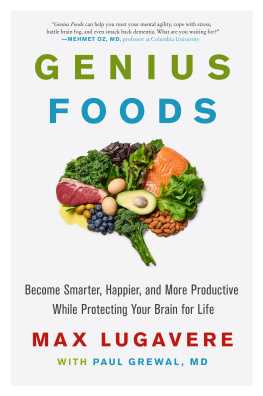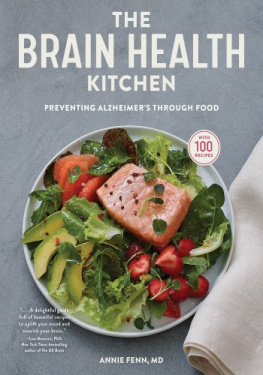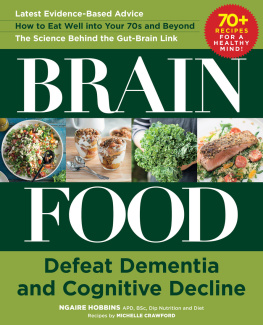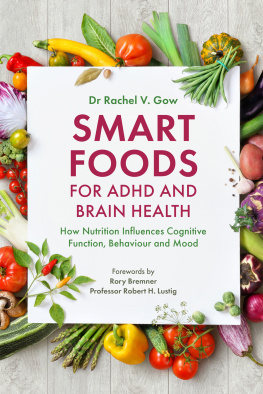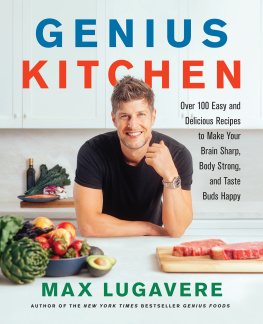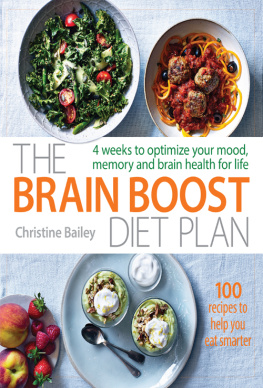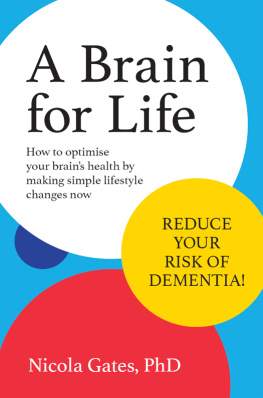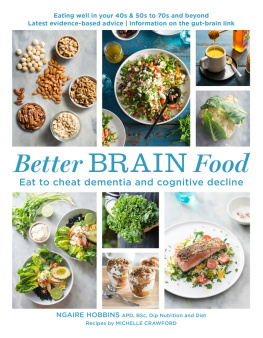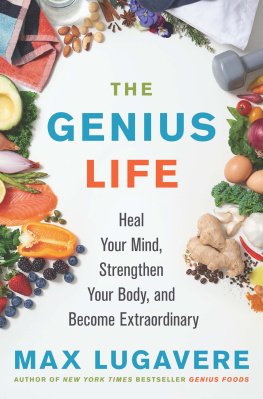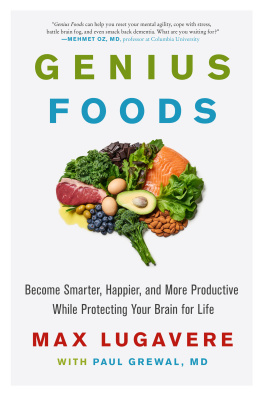Contents
Guide
Contents
Australia
HarperCollins Publishers Australia Pty. Ltd.
Level 13, 201 Elizabeth Street
Sydney, NSW 2000, Australia
www.harpercollins.com.au
Canada
HarperCollins Canada
Bay Adelaide Centre, East Tower
22 Adelaide Street West, 41st Floor
Toronto, ON M4W 1A8, Canada
www.harpercollins.ca
India
HarperCollins India
A 75, Sector 57
Noida
Uttar Pradesh 201 301
www.harpercollins.co.in
New Zealand
HarperCollins Publishers New Zealand
Unit D1, 63 Apollo Drive
Rosedale 0632
Auckland, New Zealand
www.harpercollins.co.nz
United Kingdom
HarperCollins Publishers Ltd.
1 London Bridge Street
London SE1 9GF, UK
www.harpercollins.co.uk
United States
HarperCollins Publishers Inc.
195 Broadway
New York, NY 10007
www.harpercollins.com
GENIUS FOODS . Copyright 2018 by Max Lugavere. All rights reserved under International and Pan-American Copyright Conventions. By payment of the required fees, you have been granted the nonexclusive, nontransferable right to access and read the text of this e-book on-screen. No part of this text may be reproduced, transmitted, downloaded, decompiled, reverse-engineered, or stored in or introduced into any information storage and retrieval system, in any form or by any means, whether electronic or mechanical, now known or hereafter invented, without the express written permission of HarperCollins e-books.
FIRST EDITION
Cover Design by Milan Bozic
Cover Photograph by David Malan
Images in courtesy of Mary Newport
Digital Edition MARCH 2018 ISBN: 978-0-06-256289-0
Version 04122018
Print ISBN: 978-0-06-256285-2
This book is dedicated to the first genius I ever met: my mom.
Before you play two notes learn how to play one noteand dont play one note unless youve got a reason to play it.
MARK HOLLIS
If youd have told me a few years ago that Id one day write a book about optimizing the brain, I would have been sure you had mistaken me for someone else.
After I switched my college major from premed to film and psychology, the idea of a career in health seemed unlikely. This was compounded by the fact that soon after I graduated, I became entrenched in what I considered a dream job: a journalist and presenter on TV and the Web. My focus was stories that I felt were underreported and could make a positive impact on the world. I was living in Los Angelesa city Id idolized as an MTV-watching teen growing up in New Yorkand had just ended a five-year stint hosting and producing content for a socially conscious TV network called Current. Life was great. And it was all about to change.
As much as I enjoyed the Hollywood life, Id often find myself making trips back east to see my mom and two younger brothers. In 2010, on one of those trips home, my brothers and I noticed a subtle change in the way my mother, Kathy, walked. She was fifty-eight at the time and had always had a spirited way about her. But suddenly, it was as though she were wearing a space suit underwatereach stride and gesture looked like a purposeful, conscious decision. Though I know better now, back then I couldnt even make the connection between the way she moved and her brains health.
She also began offhandedly complaining of mental fogginess. This too was lost on me. No one in my family had ever had memory problems. In fact, my maternal grandmother lived to ninety-six and her memory was sharp until the end. But in my moms case, it seemed as if her overall processing speed had slowed, like a Web browser with too many open tabs. We started to notice that when we would ask her to pass the salt at dinner, it would take her a few extra beats to register. While I chalked what I was seeing up to normal aging, deep down I had the chilling suspicion that something wasnt right.
It wasnt until the summer of 2011 during a family trip to Miami that those suspicions were confirmed. My mom and dad had been divorced since I was eighteen, and this was one of the few times since then that my brothers and I were together with my parents under the same roofseeking respite from the summer heat in my dads apartment. One morning, my mother was standing at the breakfast bar. With the whole family present, she hesitated, and then announced that she had been having memory problems and had recently sought the help of a neurologist.
In an incredulous but playful tone, my father asked her, Is that so? Well then, what year is it?
She stared at us blankly for a moment, and then another.
My brothers and I chuckled and chimed in, breaking the uneasy silence. Come on, how could you not know the year?
She responded, I dont know, and began to cry.
The memory is seared into my brain. My mom was at her most vulnerable, courageously trying to communicate her internal pain, defective but self-aware, frustrated and scared, and we were completely ignorant. It was the moment I learned one of lifes hardest lessons: that nothing else means a thing when a loved one gets sick.
The flurry of medical visits, expert consultations, and tentative diagnoses that followed culminated at the tail end of a trip to the Cleveland Clinic. My mom and I had just walked out of a renowned neurologists office and I was trying to interpret the labels on the pill bottles clutched in my hand. They looked like hieroglyphics.
Staring at the labels, I silently mouthed out the drug names to myself in the parking lot of the hospital. Ar-i-cept. Sin-e-met. What were they for? Pill bottles in one hand, unlimited data plan in the other, I turned to the digital-age equivalent of a safety blanket: Google. In 0.42 seconds, the search engine returned results that would ultimately change my life.
Information on Aricept for Alzheimers disease.
Alzheimers disease? No one had said anything about Alzheimers disease. I became anxious. Why hadnt the neurologist mentioned that? For a moment, the world around me ceased to exist but for the voice in my head.
Does my mom have Alzheimers disease? Isnt that something only old people get?
How could she have it, and at this age?
Grandma is ninety-four and shes fine.
Why is mom acting so calm? Does she understand what this means? Do I?
How long does she have before... whatever comes next?
What does come next?
The neurologist had mentioned Parkinsons Plus. Plus what? Plus had sounded like a bonus. Economy Plus means more legroomusually a good thing. Pert Plus was shampoo plus conditioner, also a good thing. No. My mom was prescribed medicines for Parkinsons disease plus Alzheimers disease. Her bonus feature was the symptoms of a bonus disease.
As I read about the pills I was still holding, repeating phrases stuck out to me.
No disease-modifying ability.
Limited efficacy.
Like a Band-Aid.
Even the doctor had seemed resigned. (I later learned a cold joke circulated among med school students about neurology: Neurologists dont treat disease, they admire it.)
That night I was sitting alone in our Holiday Inn suite, a couple of blocks from the hospital. My mom was in the other room, and I was at my computer, manically reading anything I could find on both Parkinsons and Alzheimers disease, even though my moms symptoms did not fit neatly into either diagnosis. Confused, uninformed, and feeling powerless, it was then that I experienced something Id never felt before. My vision narrowed and darkened, and fear enveloped my consciousness. Even with my limited insight at the time I could tell what was happening. Heart pounding, hungry for air, a feeling of impending doomI was having a panic attack. Whether it lasted minutes or hours I cant be sure, but even as the physical manifestations subsided the emotional dissonance remained.

